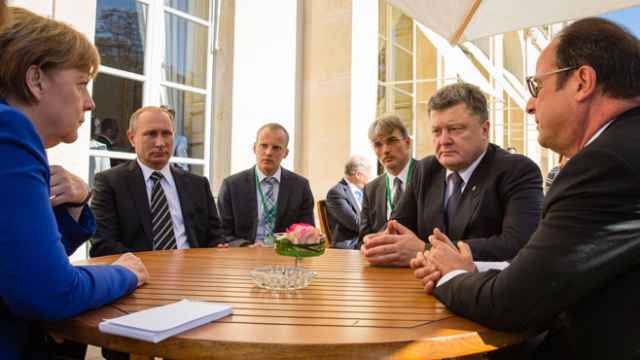A decision by pro-Russian separatists to postpone local elections that Ukraine had said were illegitimate was welcomed on Tuesday by Kiev, the European Union, Washington and Moscow — the rebels' patron — as a sign of progress in the faltering peace process.
The separatists said the elections, which they had set for Oct. 18 and Nov. 1 in two regions they control, would take place next February, potentially giving time for a compromise that would suit all sides.
The concession by the separatists comes at a time when Russia has adopted a more constructive tone in talks over Ukraine, according to diplomats involved in the discussion who say Russia has influence over the rebels.
Together with a pull-back of light weapons by both sides and signs the ceasefire is holding, the rebels' decision appeared to raise cautious optimism that genuine efforts were being made to give the troubled Minsk peace deal a chance.
"Moscow has actually delivered," a German government source said.
Under the terms of a peace agreement reached in Minsk, Belarus, in February, Kiev-organized local elections were meant to be held on Oct. 25 in the two regions, along with the rest of the country.
While denouncing rebels' plans to hold their own ballot as illegitimate, Kiev also acknowledged it would not be able to conduct its own elections there since parts of the two regions were beyond its control.
Ukrainian President Petro Poroshenko welcomed the rebels' decision as enhancing the prospect for a Ukraine-organized vote to be held in rebel regions at some stage in the future.
"It opens the way for the return of Ukraine to the Donbas [east Ukraine] via elections conducted according to Ukrainian legislation, OSCE standards and of course without occupying forces," he said in a statement on Facebook.
Putin Promise
Poroshenko said this weekend Russian leader Vladimir Putin had promised to ask separatists to cancel the disputed elections.
The European Union said the rebels' decision offered "renewed hope for a sustainable political settlement of the conflict." Kremlin spokesman Dmitry Peskov said Russia welcomed the move, which followed talks last week between the leaders of Russia, Ukraine, France and Germany on the crisis.
At the meeting, French President Francois Hollande said it would take time to organize elections in the east that respect international standards and as a result, the so-called Minsk peace process would run beyond its deadline, into next year.
The United States welcomed the election postponement, as well as reports the separatists have begun withdrawing more heavy weapons from the line of contact in eastern Ukraine.
"This will further support the cease-fire and withdrawal of heavy weapons and fighters from Ukraine as stipulated in the Minsk agreements," State Department spokesman Mark Toner said.
Apart from local elections being held, the Minsk agreement envisaged the withdrawal of Russian forces and equipment from Ukraine and the return of the joint border to Ukraine control by the end of the year. Moscow denies it has forces in Ukraine.
After street protests last year toppled Ukraine's Moscow-leaning leader and installed a pro-Western administration, Russia annexed Ukraine's Crimea region and separatist rebellions broke out in Donetsk and Luhansk region.
More than 8,000 people were killed in the conflict between Ukraine and the separatists, alleged by Kiev and its Western allies to be backed by Moscow. The Kremlin denies giving military support to the rebels.
Western countries responded by imposing sanctions on Russia which, among other things, blocked Russia's access to Western debt markets. Some economists say Russia is complying with the peace process because it needs to borrow internationally.
A Message from The Moscow Times:
Dear readers,
We are facing unprecedented challenges. Russia's Prosecutor General's Office has designated The Moscow Times as an "undesirable" organization, criminalizing our work and putting our staff at risk of prosecution. This follows our earlier unjust labeling as a "foreign agent."
These actions are direct attempts to silence independent journalism in Russia. The authorities claim our work "discredits the decisions of the Russian leadership." We see things differently: we strive to provide accurate, unbiased reporting on Russia.
We, the journalists of The Moscow Times, refuse to be silenced. But to continue our work, we need your help.
Your support, no matter how small, makes a world of difference. If you can, please support us monthly starting from just $2. It's quick to set up, and every contribution makes a significant impact.
By supporting The Moscow Times, you're defending open, independent journalism in the face of repression. Thank you for standing with us.
Remind me later.




